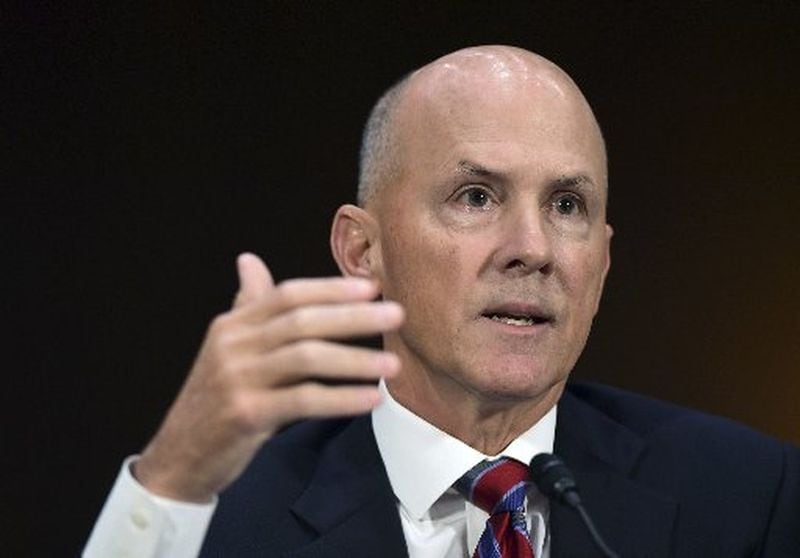Equifax is nearing the end of an embarrassing, awful year.
Since announcing in September that hackers had accessed its data on more than 145 million consumers, the Atlanta-based company has been dealing with sustained backlash. And there’s more to come as the credit reporting agency steers through a slew of obstacles, from the costs of placating consumers to the threats of legal actions.
But, even though the company failed at its core mission of protecting personal data, odds are still good that Equifax will emerge stable and successful, analysts say.
That’s because Equifax is needed, since there are only three big credit bureaus, said Jim Wanserski, who worked for Arthur Andersen and made a career rooting out fraud and corporate malfeasance.
“Competition helps tune the engine,” said Wanserski, who runs the consulting group Wanserski & Associates.
The company understands its failures, said spokeswoman Meredith Griffanti.
“We have apologized and continue to apologize for the incident, and we also acknowledged that we let everyone down by the way our response was initially handled,” she said. “Consumers put their trust in us, and we did not live up to their expectations.”
Shortly after Equifax announced the data breach, it was revealed that three executives had sold about $1.8 million in stock before the news broke and the stock price plunged.
The company’s top executive resigned. Two other high-ranking officials took retirement. There were other incidents, like the hacking of a web page for customer service.
Still it’s seems unlikely to suffer the fate of Arthur Andersen, which was virtually destroyed in the aftermath of the Enron collapse. Andersen had been the auditor for Enron, a once huge energy company that committed systematic and massive fraud.
“What happened to Andersen is not going to happen here,” said Humayun Zafar, professor in the department of information systems at Kennesaw State University.
Equifax is addressing its problems, Griffanti said. The company has bolstered its security, she said.
“Security is our top priority along with regaining consumers’ trust,” she said. “Our interim CEO has ordered a top-down review of all of our security protocols. Additionally, we are investing significantly to harden security, and we expect that spike in investment to continue for a period of time.”
John Campbell, a professor in the accounting school at the University of Georgia’s Terry College of Business, said he hasn’t seen signs that a pervasive culture is behind the problems at Equifax.
“Certainly, it can be an issue – Arthur Andersen has a culture problem,” he said. “It is possible that the culture of the entire organization is corrupt. But I doubt it. Maybe it was a matter of tone at the top, but they have addressed that.”
Whatever Equifax is doing now must serve the company’s core mission, he said. “For me, the only thing that matters is the quality of your service. You have to admit that the next couple of quarters will be difficult. You have to earn the customer’s trust back. You have to make the customer the focus every day. You have to play the long game.”
That means ignoring things that a company might otherwise pay attention to – like the stock price.
And while millions of American adults are hoping that Equifax can stop hackers from breaching their data again, a smaller group is betting many millions of dollars on it by purchasing and holding shares of Equifax stock.
Until the massive breach was revealed, Equifax was a fairly obscure multi-billion-dollar company that just happened to be essential to the financial system. Then the company became national news, the butt of late-night humor, the subject of Congressional inquests and law enforcement investigation.
Investors seem to think the company is damaged, just not fatally.
Equifax peaked above $143 a share just as the breach was being announced. In just more than a week, shares fell below $93. But by Thanksgiving week, shares had struggled back about one-third of the way to where they had been.
“I think that’s an overhang from the breach, which we said would probably happen,” said Kevin Crowley, adjunct professor of finance at Emory University’s Goizueta School of Business. “I think it’s a wait and see attitude that will likely continue for some time – I would say it will be six months to a year.”
MYAJC.COM: REAL JOURNALISM. REAL LOCAL IMPACT.
AJC Business reporter Michael E. Kanell keeps you updated on the latest news about jobs, housing and consumer issues in metro Atlanta and beyond. You'll find more on myAJC.com, including these stories:
Never miss a minute of what's happening in local business news. Subscribe to myAJC.com.







